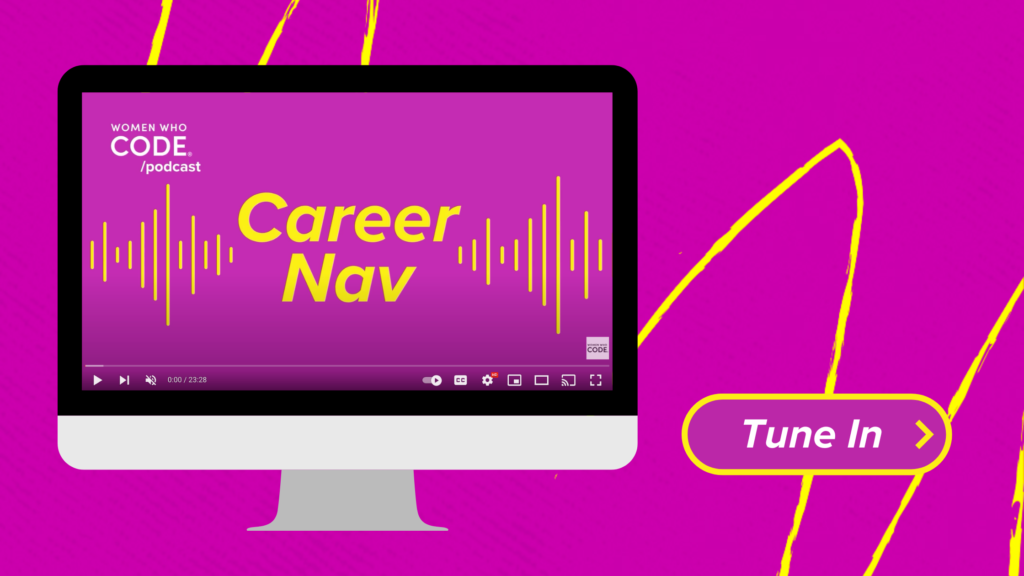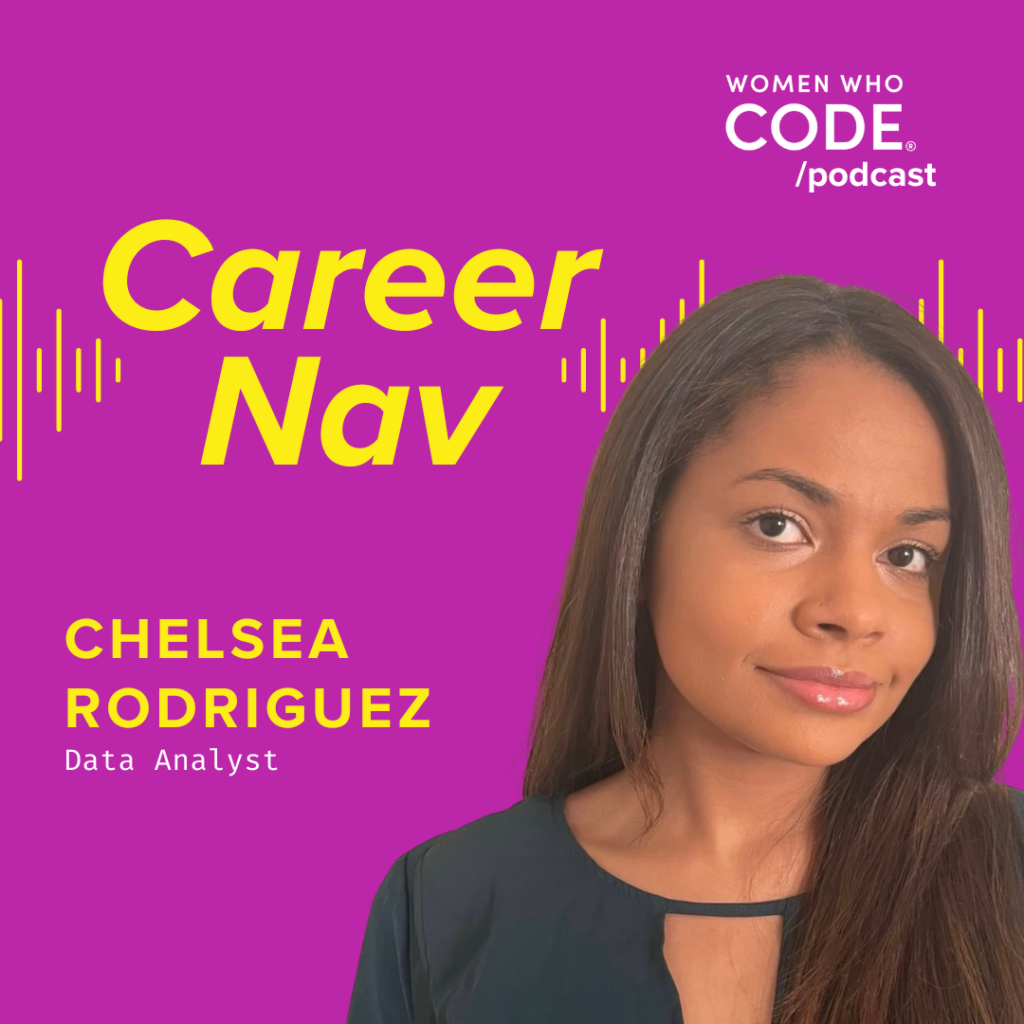Career Nav #80: Navigating the Tech Industry as a First-Generation Graduate
Written by Chelsea Rodriguez

Chelsea Rodriguez shares her talk, “Navigating the Tech Industry as a First Generation Graduate.” She discusses her challenges through school and starting her career in the tech industry. She gives tips on preparing yourself for the unexpected when you don’t have guidance from previous generations.
I am a first-generation computer science graduate. My interest in technology started in my first year of college when I took an introduction to a Microsoft application course. I started taking more and more courses. Now, I spend my time brainstorming ways to use technology to make a positive impact in this world by using data. I aim to eventually work for a nonprofit or even create a nonprofit to help others.
The first generation is the first in an immediate family to pursue a degree as a graduate. The majority of first-generation students are the first in general to pursue a degree or to complete a four-year degree. Generally, first-generation graduates have lower incomes than the general population in their schools. First-generation graduates are also less likely to be exposed to career readiness resources.
During my freshman year, I did have to speak to an advisor, and they tried to help me figure out a major, but I still needed to figure it out. I stuck with liberal arts and focused on prerequisite courses. Going into my sophomore year, I knew I needed to find out what I wanted to do. During my two-year degree, I stuck with liberal arts and decided to just graduate with liberal arts. I wanted to continue my education and was strongly interested in computer science.
I remember entering college and speaking with an advisor in my junior year. They told me I had to declare a major. I looked at all the courses I had to take, and computer science stuck out. I decided to pursue computer science. I just started this computer science degree when everybody else started in their freshman or sophomore year. I was taking my first courses in computer science. I was hearing from professors it’s important to get an internship. As a first-generation graduate, I didn’t know you needed an internship to graduate and succeed in college.
I am in my junior year, looking for an internship, and I don’t know what to do. I got an email saying to join this hackathon in the college that I was in. I was intimidated and let that opportunity go. I got another email from this organization formerly known as WiTNY Women in Technology, now Breakthrough Tech. It was a career readiness program for those who were about to graduate. They taught me about resume building, networking, where to apply, and the skills you should get for a technical degree. They exposed us to technical interviewing, which was a first for me because I needed to learn how important it was. I didn’t know it was an assessment they did during technical interviewing. I was able to land an internship as a front-end engineer.
At first, it was a little intimidating. They gave you a mentor. They filled up your schedule with a whole bunch of meetings so that you could get exposure to working in a corporate setting. I learned a lot about being a professional and then a technical professional. The internship finished, and I approached my senior year. It was the pandemic. Everything was remote, and once again, I didn’t know what to expect in my senior year and how important it was to prepare for the outside world after graduation.
I decided to focus on my courses. I applied for these roles during my last semester and started getting interviews. I didn’t expect a lot to happen in the interview like it would be six parts. When I started getting these interviews, I took a break from applying while in school because it was becoming overwhelming. I started doing my research, and that’s when I realized that there are many platforms to practice for these technical interviews, such as The Bitcode and Grokking the interview. There’s also Cracking The Code, which is a book that you could order online. They go through step by step what to expect during technical interviewing.
One thing I wished I had planned and started looking for an internship in my sophomore year. I also would have joined organizations early on. I joined Women Who Code in my senior year and wish I had joined it. They build a community and give you the necessary resources before graduation. Another thing that I would do was get a mentor.
Since I was the first in my family to pursue a computer science degree, I didn’t know what to expect. A mentor would’ve helped with the missing details that I needed. I spent a lot of my time focusing on my courses and didn’t research the industries I could work for and the job roles I could get after college. I would have also researched salary expectations. And last, I would have spent more time networking.
After college, it seems imposter syndrome is inevitable. You compare yourself to everyone. The way I overcame my imposter syndrome was by spending more time upskilling. I was taking courses outside of college and looking at the job descriptions and what to expect. I took a break from social media like LinkedIn and stayed in my little bubble as I upskilled and became more familiar with the tech industry.
Another thing that helped me with overcoming imposter syndrome was working on my elevator pitch and public speaking in general. You must know how to communicate with non-technical and technical people, which helps with your confidence. The more you talk to these people, the more you’re able to start conversations and communicate with them, the easier it becomes. That imposter syndrome begins to dim down a little. Another thing to keep in mind is your end goal.
You might be comparing yourself to senior-level people, but remember that you will be in that senior-level role at some point in your life. It’s important to find an organization to be a part of. The tech industry is huge now, and you might feel lost. Organizations like Women Who Code help with that. They speak about their experiences, and you don’t feel alone. Find an organization that suits your interests and your life path.
Use your resources. Join a career readiness program. If you are in school, use their resources. Most schools have career advisors. They can help with what to expect and the jobs you should apply to. Your tuition pays for a lot of the applications that you use today. Utilizing them while in school is important because you don’t have them after graduation. GitHub has a school account where you can create a portfolio. It has all the apps you can use to deploy your application for free with that student account. The whole Microsoft application is free to you. PyCharm is free while you’re in school. Those are just a few resources I recommend while you’re in college.
Throughout my college experience, I worked part-time, so I only utilized Indeed to look for part-time roles. After graduation, I thought that was the same: looking for a career position. I only utilized Indeed for the first three months of job searching. When I started researching, I realized many job boards, such as the Women Who Code job board, have junior to senior-level roles. LinkedIn, of course, has a job board as well.
If you’re in New York City, they have one called ‘Tech: New York City.’ Do your research before going to these job boards because some need to screen the jobs they’re posting. You could be subjected to fraud, which I wish I knew. If you see a role you’re interested in, ensure the company has that role available.
Going into interviewing for these technical roles, I thought it would be 30 minutes long, and they were going to ask me about my experience and degree. It was the complete opposite of that. In my first interview, they told me to explain my experience as a front-end engineer.
I went through that, and they said, “Congratulations, you made it to the next round. Now, we are going to have a code pairing exercise.” You code live for them so they can pick any problem they want you to solve, and you have to code it either with them or by yourself and come up with a solution. My recommendation is to do those LeetCode problems. At least do one a week while you’re in college because it is tough to be a full-time student doing these problems. Get a peer in your class, somebody who’s doing this technical degree with you, and interview with them. The more you practice, the more you become comfortable doing these problems. Learn the STAR method. This is especially important for behavior interviewing. When they ask you about your experience, it’s important to communicate with non-technical and technical people.
The behavior could be more technical. Be able to talk about the skills that you have in the situation based on the past professional experience that you have. The STAR method starts with the situation and then how you solve the situation. I just learned that interviewing for a technical role usually takes three to six interviews before you get an offer. Usually, they give you three coding interviews or exercises, and then you talk to the different departments in the company that you’re applying to.
After getting the role you want and being in the industry, remain curious. Keep learning and stay up to date with technology. Keep updating your resume or your portfolio. Stay involved. Don’t give up because you have future generations looking up to you. They will appreciate that you didn’t give up and you put in the hard work and made it. You are going to work for the technical industry, and you are going to make a positive impact.
